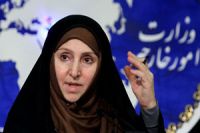
 Iran has expressed deep sorrow and concern over the deadly clashes between protesters and militiamen in the Libyan capital of Tripoli.
Iran has expressed deep sorrow and concern over the deadly clashes between protesters and militiamen in the Libyan capital of Tripoli.
According to Press TV, Iranian Foreign Ministry Spokeswoman Marzieh Afkham on Saturday called for national unity and the disarmament of militia groups in the North African country.
She also extended condolences to the families of the victims.
More than 40 people were killed and over 400 injured in two days of clashes between protesters and former rebels who toppled longtime dictator Muammar Gaddafi in 2011.
The deadly violence began Friday after militiamen opened fire on a large group of protesters who had marched to the headquarters of the Misrata militia to demand the militiamen’s eviction from Tripoli.
Prime Minister Ali Zeidan called on both sides to “exercise maximum restraint” and urged an end to the clashes.
Nearly two years after the fall Gaddafi, Libya remains grappling with lawlessness and insecurity, with fierce clashes erupting between rival militias.







